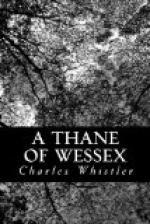I had been on Brent once or twice before, but then it had been deserted, and my eyes had had time and inclination to look out over the wide view of hill and plain and sea and distant Welsh mountains beyond that. Now I thought nothing of these things, but looked up to where it seemed that I must be judged. I could make out one or two banners pitched and floating idly in the sunshine, and one seemed to have a golden cross at its stave head; but I could make out none of the devices on them, and so I looked idly back on the crowd again. And then men brought us food and ale, and at last, after some gruff talk among themselves, the guards untied my hands, though they left my feet bound under the saddle girths, and bade me help myself.
Nor was I loth to eat heartily, with the freshness of the ride on me, and with the hope of freedom strong in my heart.
Then we waited for an hour or more, and the sun began to slope westward, and my guards seemed to grow impatient. Still the crowds did not thin, and if one group of performers ceased another set began their antics.
At last a richly-clad messenger came towards us, the throng making hasty way for him, and spoke to the leader of our party. Then, following him, we rode to the foot of the great mound, and there dismounted. And now they bound my hands again, and if I asked them to forbear I cannot well remember, but I think I did so in vain. For my mind was in a great tumult as we climbed the hill, wondering and fearing and hoping all at once, and longing to see who were my judges, and to have this matter ended once for all.
We passed, I think, two groups coming down from some judgment given, and of these I know one contained a guarded and ironed man with a white, set face; and the other was made up of people who smiled and talked rapidly, leading one who had either gained a cause or had been acquitted. There were perhaps other people who met us or whom we passed, but these are the two I remember of them all. Then we gained the summit and stood there waiting for orders, as it seemed, and I could look round on all the ring.
And at first I seemed to be blinded by the brilliance of that assembly, for our Saxon folk love bright array and fair jewellery on arm and neck. Men sat four and six deep all round the great circle, leaving only the gap where we should enter; and right opposite that gap seemed the place of honour, for there were a score or more of chairs set, each with a thane thereon, and in the midst of them sat those behind whom the banners were raised. Near us at this end of the circle were the lesser freemen, and so round each bend of the ring to right and left in order of rank till those thanes were reached who were highest.
Before those stood some disputants, as it seemed, and I could not see the faces of the seated thanes clearly at first. But presently I knew the banners—they were those of Eanulf the Ealdorman, and of Ealhstan the Bishop. And when I saw the first I feared, for the great ealdorman was a stern and pitiless man, from all I had ever heard; but when I knew that banner with the golden cross above it, my heart was lighter, for all men loved and spoke well of the bishop.




